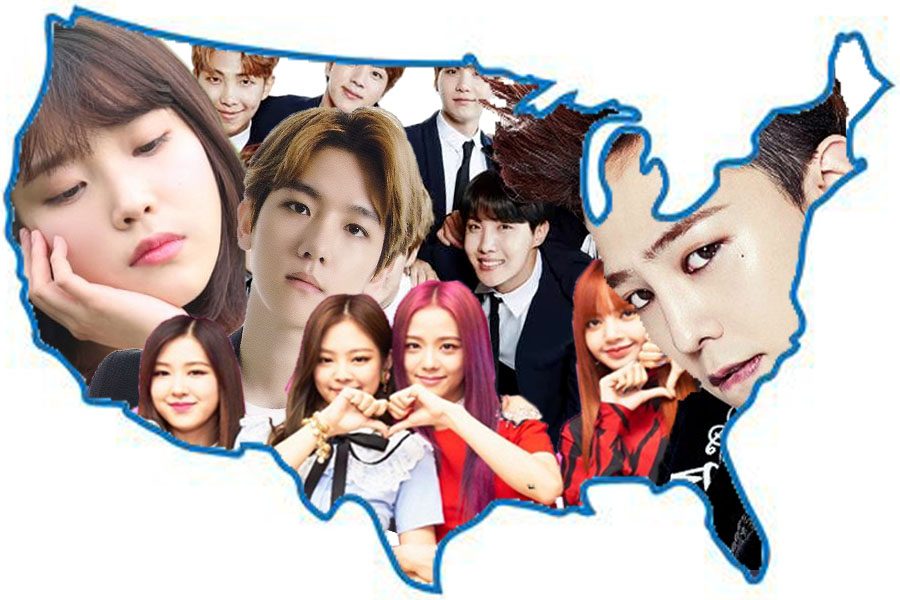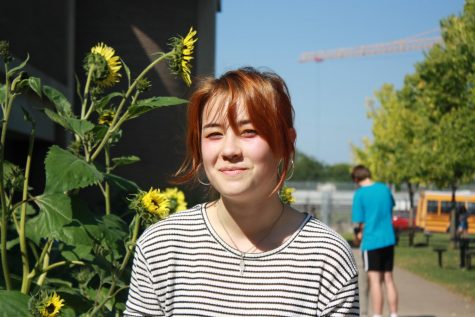K-pop brings a new voice to America
November 29, 2018
Being Korean means being ugly, idiotic, and always the butt of a joke. Or at least that is what I was told from others when growing up. For the most part, I’m fairly white passing. However, there have always been those who can tell that I am mixed. I have round pale face, straight dark hair, and my eyes are thinner than those you would expect of a white person.
I went to an elementary school where I knew of only nine other Asian kids in the whole school. Two of which I am related to. When attending elementary, people would sometimes stretch the corner of their eyes and say, “ching chong” or ask if I ate dog. Kids would grab my arms and legs to watch my skin turn white and then turn tinted yellow again saying that I was “turning Asian”.
When some of my peers learned about the bomb threats from North Korea, some of them would ask me if I was going to bomb the school, even though my family is from South Korea. Many of these things were done in front of teachers that wouldn’t do anything about it.
I remember standing in front of a mirror at times pushing the corners of my eyes to look more Caucasian.
It wasn’t until middle school that I began to learn to accept my ethnicity. My journey towards acceptance began when my cousin introduced Korean pop music to me. I remember watching these beautiful and talented people that looked more like me.
The thing that struck me the most was the fact that these Korean pop stars had fans. People were actually influenced by them. From there on I started to take more pride in being Korean.
Over the past five years or so I have noticed Korean pop culture (K-Pop) becoming increasingly more popular in the United States. When people ask where in Asia my family is from they now ask if I am Korean, rather than if I am Chinese or Japanese. Being Korean has now become a topic of interest. People want to know if I speak Korean, what my favorite dish is, and (of course) if I listen to K-pop.
When talking to some of South High’s devoted K-pop fans I found that K-pop has inspired many non-Asian youths as well. Senior, Rain Been, was introduced to K-pop in their first year of high school. Been explained that before being introduced to K-pop they were more of a grunge and punk kind of music lover and now, “I listen to like everything,” said Been.
Other students have stated similar things, such as senior Kanaan Gudeta who said, “It made me more open-minded.”
Even though some students are very open about their enjoyment of K-pop, junior Jamila Bihi explains that there is some stigma to listening to Korean music because of not being able to understand the language. Bihi said, “A lot of people like it but they’re just so shy about it, but I’m not shy about it… I think that people are shy because people have a stereotype about K-pop. They’ll be like, ‘Oh you don’t understand it just ching chong music and stuff. And they are disrespectful about it because they don’t understand it.”
These K-pop fans were all attracted to one main aspect of the music; the message. American pop was repeatedly being described as inappropriate due to the negative context of sex and drugs. “They’ll be like, ‘Oh you don’t even know what it’s saying. You don’t what’s the meaning of the song’ and I’m like, ‘I’m pretty sure it’s better than what you’re listening to.’,” said Bihi
Been said, “If you actually look up the words from Korean pop its like, ‘Oh we’re going to talk about something that’s actually really deep and meaningful’.”
“I still get what they mean. I still connect to it,” said Gudeta.
For Gudeta, K-pop makes her feel more confident in herself. “The message and the energy they try to get across is really good,” said Gudeta. “It talks about loving yourself and having confidence in yourself, which I lack a lot.”
“Especially BTS [a famous K-pop group]; they talk about loving yourself, learning about how to go through depression, and all this mental illnesses… It’s just all around positive… They talk about stuff that people really do go through,” said Bihi.
The last person I interviewed was a Korean exchange student, junior Jeyoung Boo, who has been living in the United States since January. “I was very surprised [about the popularity of K-pop in the United States] because I know that K-pop is popular but… it’s more popular than I thought,” said Boo.
Boo believes that all this recognition that Korea has gained due to the international popularity of Korean pop culture has been beneficial to Korea. “Before I am born we were [a] really poor country and we are getting better… and because of… K-pop… more people are getting [to] know [more] about Korea,” said Boo.
Korean pop culture has made its impact in America. Its positive message has created a community of K-pop fans. Been described a situation where their friend and them were talking about K-pop when someone else jumped into the conversation and said, “‘Welcome to the world of Kpop; where everyone knows everyone in this school basically just because you like KPop.’ It’s so weird, but kind of cool at the same time,” said Been.
Every single person I interviewed said that they have made more friends from bonding over Korean pop culture. “I say I’m Korean and we talk about K-pop,” said Boo.
Due to this popularity of K-pop in the United States, I no longer believe that being Korean means being ugly, idiotic, or always the butt of a joke. I now believe that Korean is beautiful, strong, and should be taken just as seriously as anyone else.
“I’m proud of my country,” said Boo.







